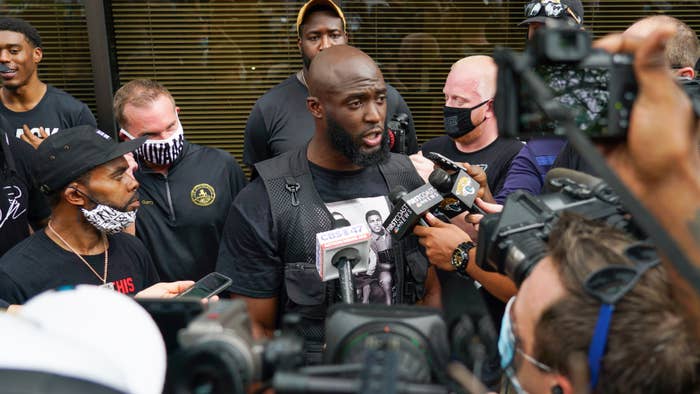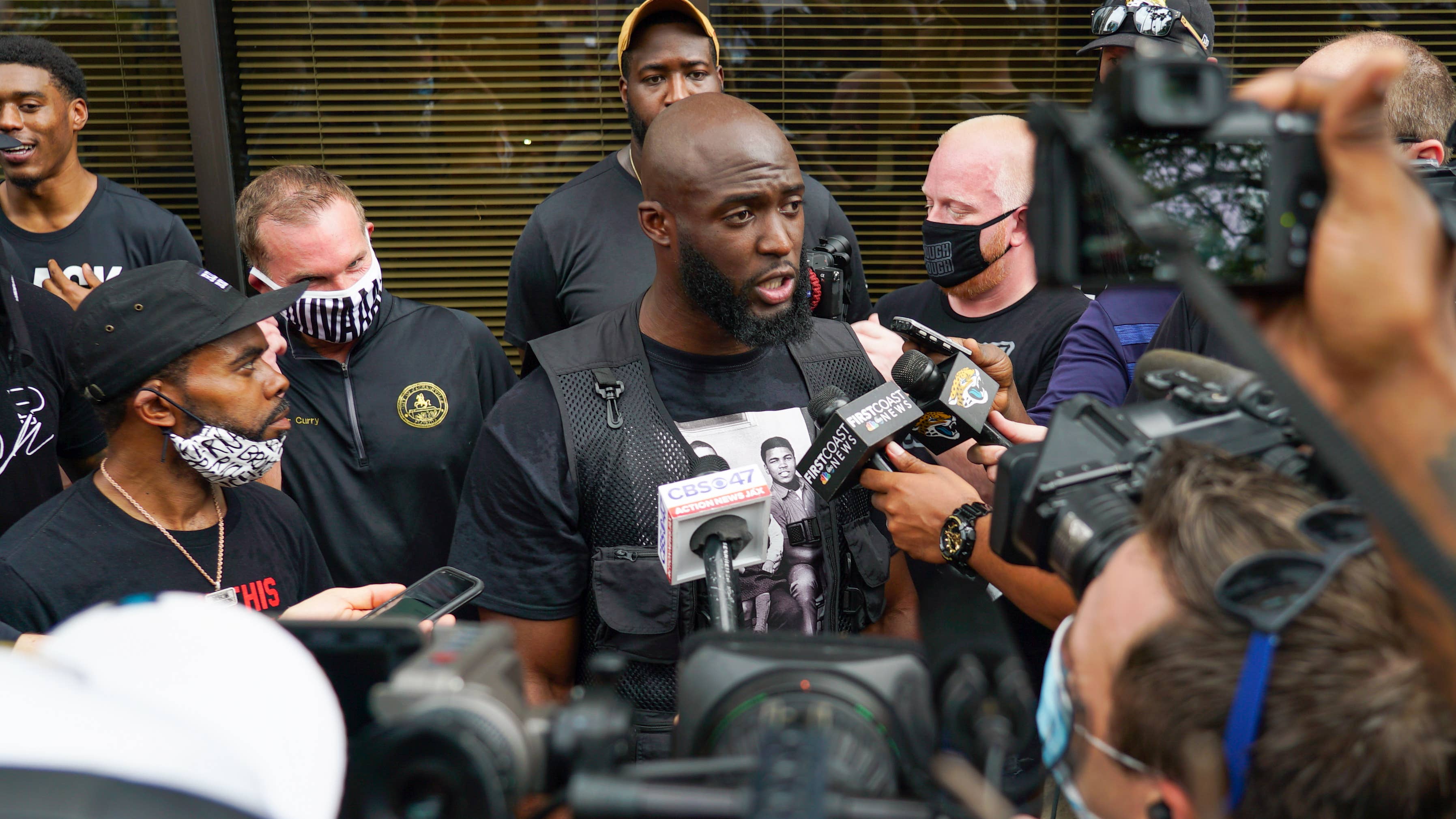
Leonard Fournette is used to following the lead of his blockers on the football field, but on the streets of Jacksonville, the Jaguars running back tried a different role Tuesday. And it’s one he plans on reprising.
The seventh-leading rusher in the NFL last season organized and led a march to City Hall in the latest example of athletes taking to the streets and encouraging action in the fight against systemic racism. Joined by teammates and supporters of all backgrounds who heeded his call on Twitter, it was a small step in the struggle to erase the corrosion of racism from one of the NFL’s 32 communities. But his actions already produced results and Fournette is incredibly proud of the response while also promising to do more.
“This is history. [How] do you want to be remembered in history? Do you want to be the ones that caused it or fixed it?” says Fournette. “I’m trying to be on that fixed it side. I want to be one of the leaders that’s going to keep the light shining bright.”
Like every other American fed-up with the status quo who has rallied, protested, and advocated for change in the wake of George Floyd’s death, Fournette felt like he had to do something. And after watching teammates march around Jacksonville last week, Fournette decided to organize a protest. It started at City Hall, wound it’s way to the Duval County Courthouse, then back where Jacksonville mayor Lenny Curry pledged to draft legislation to bring various city groups together so they can “be heard to help guide decisions” on substantive reforms. More immediately, the city removed a racist Confederate monument from a park across from City Hall and plans to take down others.
“I come from being poor to a millionaire and I’ve seen the way cops treated people in my neighborhood. If you have a name, or you have a face, the treatment is different.”
It was Fournette’s first protest and a powerful reminder that his voice and platform can elicit change. “We have to speak things into existence and put the work in and that’s what I did,” he says.But since the battle for equality in America sadly feels like it’s only in the first quarter, there’s a long way to go. Fournette has too many sad, disturbing stories to prove it.
Like so many black people, the LSU product will tell you all about the messed-up double standards that pollute society. Fournette saw it growing up in New Orleans where he recalls his father’s run-in with police during what was supposed to be a quick trip to the corner store. His father, venturing out to get his young son a bag of chips, was pulled over, cuffed, and held in the back of a cop car for hours on bogus accusations. Fournette was just 4 or 5 years old, but he’ll never forget it. Same goes for the run-in he had with law enforcement a few years ago.
“I come from being poor to a millionaire and I’ve seen the way cops treated people in my neighborhood. If you have a name, or you have a face, the treatment is different,” says Fournette. “I can remember one time I got pulled over like two years ago and I remember this cop called me ‘boy.’ And I showed them my ID and he’s like, ‘Well you’re Leonard Fournette.’ So the whole circumstance changed when he saw my last name, but imagine the guys who don’t have last names like mine and imagine how they would’ve treated them or what they go through now.”
That’s why he took to the streets Tuesday. He had plenty of support from his teammates like linebacker Myles Jack, wide outs DJ Chark Jr., Keelan Cole, and Chris Conley, safety, Ronnie Harrison, and defensive tackle Abry Jones. They all marched and listened to Fournette passionately speak about how “it’s hard being black out here right now.”
As for how he keeps the momentum around his activism going, Fournette has pledged to use his voice and platform as one of the best running backs in football to continue to advocate for change locally and nationally. Most interestingly, he says he and his Jaguars teammates haven’t discussed what kind of protest, if any, we’ll see when the NFL returns. For now, the Jaguars will stew on ideas and when training camp opens (hopefully) in July they’ll come to a consensus. If it’s kneeling during the anthem, Fournette wants to remind everyone the flag is not the issue.
Be the change let’s do this everywhere ...... https://t.co/yJTE5Y4bwQ
“We’re going to keep talking about what’s the best thing to do,” he says. “It’s never about the flag. I have family in the military. We just want to open everybody’s eyes that it’s deeper than that.”
Whatever they settle on, the Jaguars will have the support of head coach Doug Marrone and owner Shahid Khan. Marrone organized a team Zoom meeting recently where the Jaguars openly talked about their reactions to Floyd’s disturbing death and the unrest is spurred. Fournette says he and his teammates left the meeting knowing Marrone and Khan are “100 percent with us no matter what we do—protests, anything.”
A handful of years ago, it’s fair to wonder if coaches and owners would be so supportive, but times have changed. So too, thankfully, has the appetite for substantive civic reform in Jacksonville and other cities across the country. Fournette’s first time carrying the rock as a protester and voice for change was a success. Like all the best running backs, he's ready to put his team and his community on his back.
“The job is not done yet,” he says. “We have a lot more to go.”

